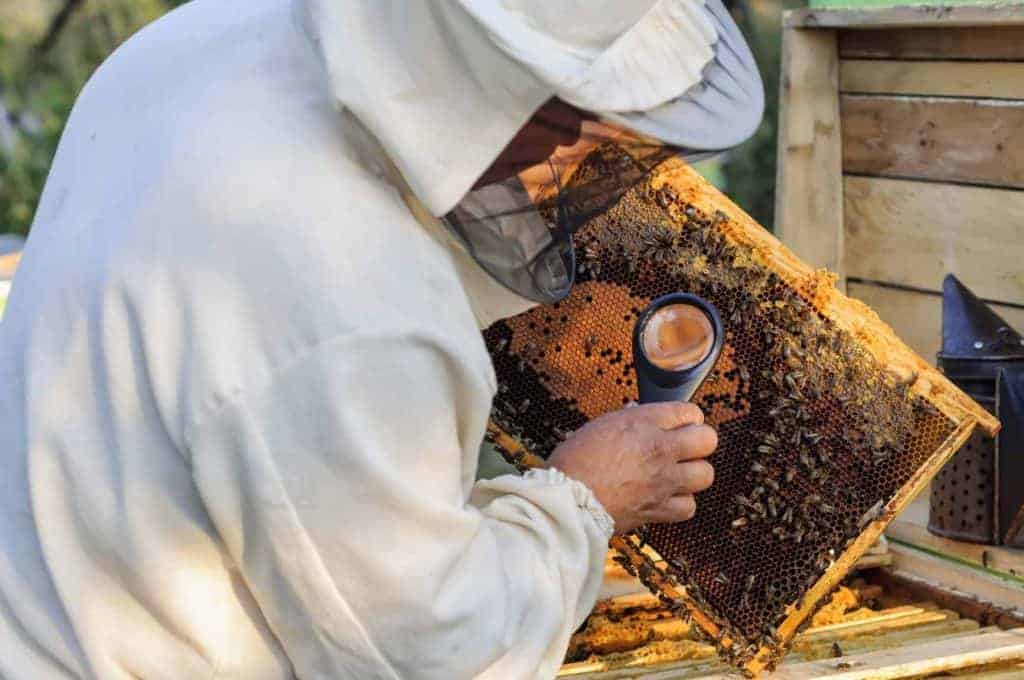Honey bees matter! They are essential not just to us, as beekeepers, but to the human race as a whole. Likewise, the role of the beekeeper has become ever more important as global threats to bees have grown. Indeed, this is one of the reasons many beekeepers choose to keep bees, namely because bees are so important.
How Pollination Relates to Our Daily Lives
The quality of life enjoyed by the human race the world over depends on this fascinating insect. This is not due to the products we harvest from our hives but to the pollination of our food supply.
Most crops grown for their fruits, such as squash, cucumbers, tomatoes, eggplants, melons, berries, coffee, nuts, and seeds, require insect pollination. The cotton we use to make many consumer products, and even the alfalfa grown to feed livestock, need the assistance of insect pollination.

It has been estimated that 75% of the world’s crops benefit, to some degree, from animal pollination. But only 10% depend fully on animal pollination. One explanation is that pollinator-dependent crops tend to have lower average production levels than non-pollinated crops. Therefore, it would appear that most of the calories that sustain human life derive from non-pollinator-dependent crops. However, this in no way degrades the importance of pollination on our food supply. Imagine the economic fallout of a pollinator crash on the California almond industry or the sudden absence of coffee from our lives.
Of even greater importance is the fact that the global demand for animal-pollinated crops is increasing faster than the demand for non-pollinated staples. The production of animal-pollinated crops grew from 3.6% of the total global crop production in 1961 to 6.1% in 2006, with the largest change occurring since 1990. More people around the world want their coffee, blueberry muffins, almond milk, almond bars, ice cream, and fast-food burgers – and at an ever-increasing rate.
So, how important is bee pollination to the quality of human life? Living in an economy where bee-pollinated crops make up a significant fraction of a “normal” diet, it appears they are very important. But there is one more fact we must consider.
Over the last few decades, more of the world’s food production has been shifting to developing countries. Due to the comparatively low productivity of pollinated crops, with an increasing world demand for food, there is pressure to bring more land into agricultural production. The lower investment and weaker environmental protection in these areas make them ideal but create a justifiable concern over deforestation and habitat loss.
The most effective way to change the current trend is to invest in large and sustainable pollinator populations in order to create a diverse, healthy ecosystem able to sustain all living beings.
Our Responsibility
As beekeepers, we have both the responsibility and opportunity to advocate for pollinators, in order to protect the biodiversity enjoyed by all species of our planet.
All insects, good and bad, wild and managed, have been declining over the last half-century. The increase in the use of pesticides in agricultural and urban areas, as well as a decrease in environmental diversity, puts tremendous pressure on pollinators.
Responsible Pesticide Use
Pesticides are categorized according to their intended use as well as their chemical composition, which includes insecticides/acaricides, fungicides, rodenticides, and herbicides.
Pesticides usually contain an active ingredient with a known mechanism for killing the target pest and vary widely in their safety to humans and the environment. More than 1,200 chemicals are registered for use in the United States and are used in some 18,000 separate products under various trade names.
Some insecticides warn of potential toxicity to bees on their label. The level of toxicity can vary from moderate, unnoticeable to the beekeeper, to honey bee deaths.
Insecticides with a sub-lethal effect on honey bees may still result in reduced larval survival, altered foraging behavior, or shortened lifespan of adult bees. The extent of the sub-lethal effects is still unknown and is a much-debated topic. As scientists continue to investigate the possible harm to honey bees, we can teach the public about safer alternatives to these chemicals.
More Bee-Friendly Landscape
By reducing our seemingly endless green lawns, creating more natural gardens, and attracting predatory insects for the pests of our crops, we can have a significant impact on the survival rate of our bees.
Farmers can help by planting fallow fields and road edges with flowering plants to support wild pollinators throughout the growing season. They can also reduce pesticide use, especially during crop bloom when more bees are in their fields.
The average person can help, too. By filling their gardens with diverse, native plant species and limiting pesticides, we create pollinator-friendly spaces and help keep their local pollinator community diverse, healthy, and beautiful.
Teaching Future Generations
All beekeepers know that bees are some of the most important critters on our planet. Without these striped insects, we’d be in serious trouble. That means it’s our job to protect them and to teach future generations how to do so as well.

As we grow older, the younger generation will care for bees and the ecosystem of which they are a part. It is our responsibility to teach how critical bees are for the diverse plant life we enjoy on Earth. This is also a key step in helping them build a better future for all life. With some hands-on education and a few fun facts, you could be the one to inspire the next beekeeper to solve one of the many problems facing our bees.
Often, children have a fear of bees because they sting, but they are also curious and fascinated by them. While it’s important to respect bees, fearing them doesn’t need to be part of the equation. Suit them up and bring them into the bee yard, or bring an observation hive to them so they can view the bees up close. Show them the difference between workers, drones, and the queen as you explain the job each performs in the hive.
Children are fascinated by waggle dances, pollen baskets, and how bees make honey and comb. This is just the beginning of explaining the importance bees have in our world and our importance to them as their keepers.
The best tool against fear is education. By learning about bees, our children can begin to understand that these tiny creatures are much more than buzzing, stinging insects. They help bring us flowers, honey, fruits, vegetables and so much more.
Helping Create Stronger Bees and Colonies
If we dedicate ourselves to creating strong colonies, we increase their chance of survival. Nutrition, strong genetics, healthy queens, and best practices are all important challenges beekeepers must address.
It is common practice for beekeepers to use sugar syrup, corn syrup, and pollen substitutes to try to meet the increased nutritional demands of their colonies. Nutritional demands are not always met by a diverse source of natural habitat.
Intensive mono-crop agriculture, urbanization, and demand for pollination services early in the year have taken away the strong pollen and nectar sources our bees once had. We must advocate for pollinator-friendly communities as we teach the importance of replacing our green lawns with native plants and gardens. Just as humans need a varied diet, so do our bees. Studies have shown the increased health and survival of bees with access to diverse sources of pollen and nectar.
The queen’s ability to mate with multiple drones promotes genetic diversity in our honey bee colonies. Several studies have found that this improves disease resistance and productivity of colonies, including their overwintering ability. Honey bees can be bred for different traits, including hygienic behavior, varroa resistance, stronger foragers, over-wintering ability, and stronger, gentler bees.
Healthy, strong queens equal healthy, strong hives. The honey bee queen is responsible for producing all the workers in the colony, so her genetics are vital to the quality and strength of the colony. A poor-quality queen can have a severely negative impact on colony health and productivity.
Beekeepers often cite queen quality as a major factor underlying colony failure. Therefore, proper management of honey bee colonies is a critical component of their health and productivity. Reducing as many stressors as possible, through proper techniques, will increase the survival rates of colonies.
Colony location, allowing access to adequate foraging sites that are distant from areas where pesticides are being applied, is the first step. Beekeepers can also provide supplementary nutrition during periods of low nectar flow. Actively monitoring for pests, such as Varroa mites, small hive beetles and Nosema is necessary to determine when and what type of treatment would be most advantageous.
Chemical or non-chemical methods to control these should be considered as needed. Minimizing exposure to pathogens, such as viruses and bacteria, by systematically replacing used brood comb with fresh comb is another way to help. Using genetic stocks of bees that are more resistant to pests and pathogens is also an excellent way to reduce complications from these two stressors.
These are just several ways we can address the important job of the beekeeper, assuring the continued survival of our favorite insect.
Author: Judi Bogardus, PerfectBee Ambassador

Sources
Deplane, Keith S. (n.d) On Einstein, Bees and Survival of the Human
USGS Science for a Changing World. (n.d) Why are Bees Important
MSU Department of Entomology (n.d) Pollination